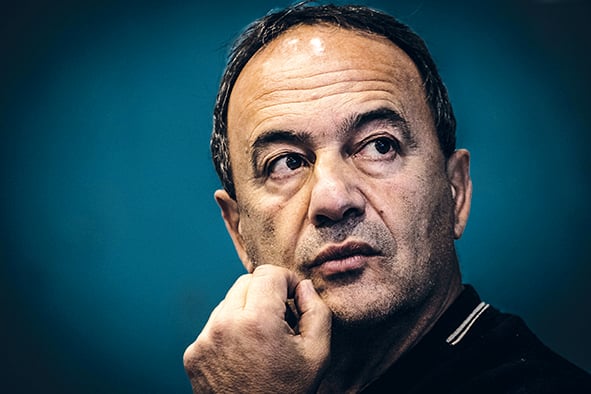Interview
Mimmo Lucano: ‘Riace was a revolution’
‘I hope that this experience can be an example for Europe. Not a Europe of barbed wires, barriers, internment camps, but a Europe of democracy, welcoming, solidarity.’

“I am happy. I think about this experience in the light of the political struggle. It was about me, but it could have been about anyone else. For me, it was an experience tied to the activism that I never stopped pursuing,” Mimmo Lucano tells il manifesto, finally feeling relieved after years of trials and deeply-felt solitude.
The Court of Cassation has put a final nail in the coffin of the prosecutors’ theory that tried to cast Riace as a criminal model. After being acquitted of all the most serious crimes – with only the 18-month suspended sentence for forgery left standing by the Court – the MEP has a smile on his face: “Yes, it's true, the conviction for forgery remained. But to be honest, I don't even understand the nature of that offense. It is an administrative offense, which I don’t see as being in any way relevant.”
What is your view on what happened in all these years of trials?
I didn't even realize this at first, but at a certain point it dawned on me that those in power could not afford to let what was happening in Riace stand. Riace had overturned the paradigm of the criminal narrative on migration, partly because of the spontaneous attitude of the locals, one of warm welcome and hospitality. It’s an anthropology that fosters a sense of solidarity. I wanted to tie all this to a political value: standing on the side of the weakest, of the migrants, of those living in social hardship.
Do you think there has been a political backlash against you?
The Riace experience was a real revolution. The one that comes to mind right away is the figure of Dino Frisullo, who made me get passionate about the Kurdish issue and the Palestinian issue. And also director Wim Wenders, who spoke of Riace as a utopia that would be inevitably hampered. It is a battle that pits the values of the left, based on equality and solidarity, against those of the right, which unfortunately speak another language: that of racism, violence, Libyan concentration camps and torturers.
What remains of the Riace model today?
Today, Riace is still standing, despite all the difficulties. We have kept going for five years, including under a different municipal administration, but now we want to look to the future. We don’t want Riace to become one of the many places marked by social decline and oblivion. Welcoming migrants has brought hope, not only for the migrants but also for local communities: welcoming means opening new schools, kindergartens, places of worship.
Can we still talk about welcoming in a time of deportations to Guantanamo and Albania?
The migration issue is central to a worldwide debate that spans from the United States to Europe, via Italy and Libya. The solutions proposed are often inhumane. Italy has contributed to this tragedy by signing the memorandums with Libya at the same time that Riace was being criminalized: they could not allow a small municipality to tell a completely alternative story.
What do you hope for the future?
I hope that this experience can be an example for Europe. Not a Europe of barbed wires, barriers, internment camps, but a Europe of democracy, welcoming, solidarity. Europe must choose: either it continues on the latter path or it abandons itself. After this ruling, we can say that the Riace model is not just a dream, but a possible future.
Originally published at https://ilmanifesto.it/ora-riace-diventi-un-esempio-per-leuropa-della-solidarieta on 2025-02-13
